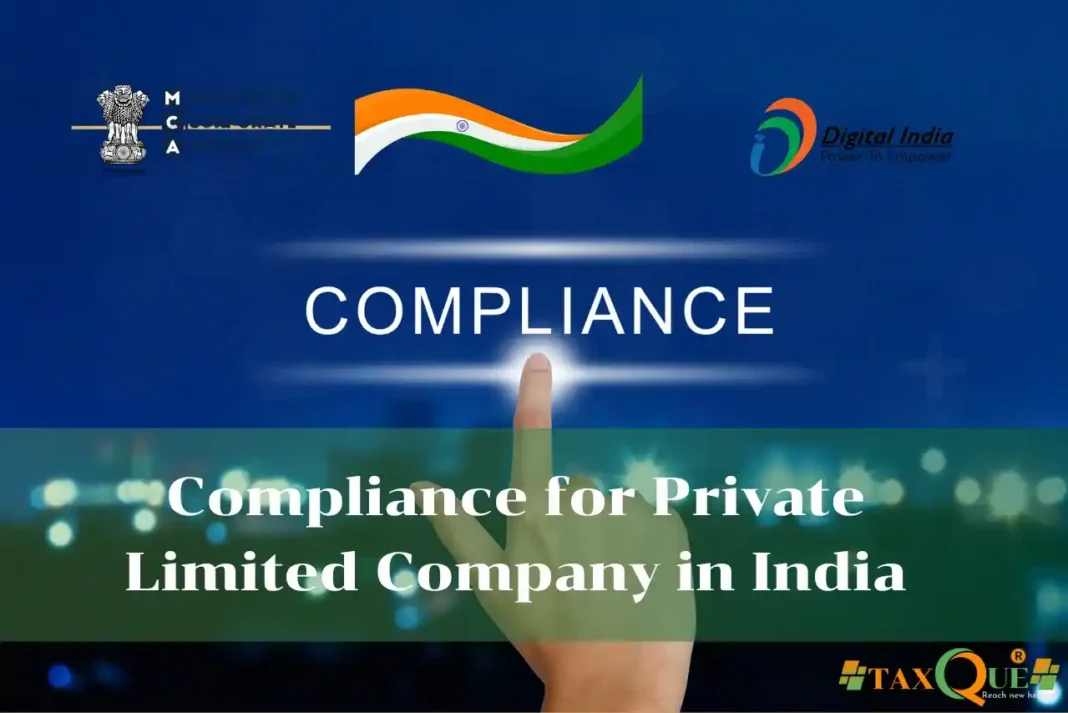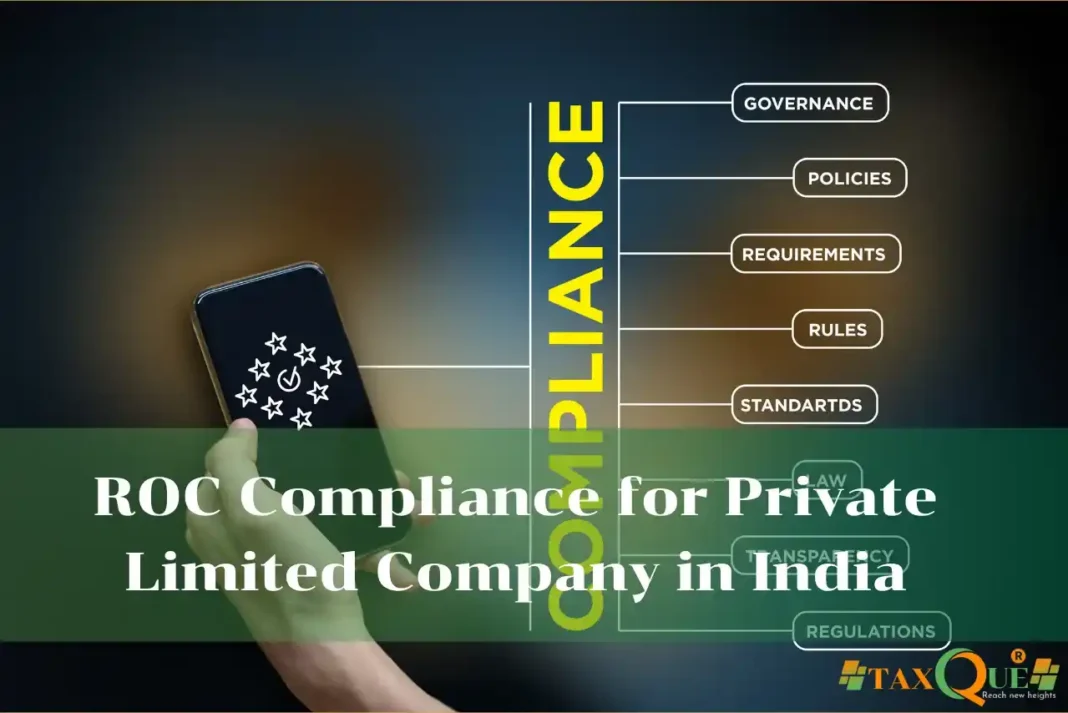Introduction
Compliance for private limited company is a cornerstone of operating a legally sound business in India. Private limited companies, registered under the Companies Act, 2013, must adhere to statutory, tax, and regulatory obligations to avoid penalties and maintain credibility. This blog provides a detailed guide on compliance for private limited company, outlining key requirements like ROC filings, GST returns, and ITR submissions, and explains how TaxQue simplifies the process for businesses.
What Is Compliance for Private Limited Company?
Compliance for private limited company involves fulfilling legal and regulatory requirements set by authorities like the Ministry of Corporate Affairs (MCA), Income Tax Department, and GST Council. These obligations ensure transparency, accountability, and trust with stakeholders. Non-compliance can lead to fines, director disqualification, or company dissolution.
1. Key Areas of Compliance
To achieve compliance for private limited company, businesses must focus on:
- ROC Compliance: Filing annual returns and financial statements with the MCA.
- Tax Compliance: Submitting GST returns, ITR, and TDS/TCS filings.
- Labour Law Compliance: Adhering to Provident Fund (PF), Employees’ State Insurance (ESI), and employee regulations.
- Audit Requirements: Conducting statutory audits for financial accuracy.
- Corporate Governance: Holding board meetings and Annual General Meetings (AGM).
2. Core Compliance Obligations
Here’s a breakdown of compliance for private limited company requirements:
| Compliance Type | Requirement | Frequency/Deadline |
|---|---|---|
| Form AOC-4 (Financials) | File balance sheet and P&L statement | Within 30 days of AGM |
| Form MGT-7 (Annual Return) | File shareholder and director details | Within 60 days of AGM |
| ITR-6 (Income Tax Return) | File company’s income tax return | October 31 (non-audit) |
| GSTR-9 (GST Annual Return) | File consolidated GST return | December 31 |
| TDS Returns (24Q, 26Q) | Report deducted tax | Quarterly |
| Statutory Audit | Audit financials by a CA | Before AGM |
| AGM | Hold annual general meeting | September 30 |
- ROC Filings: Submit Form AOC-4 and MGT-7 after the AGM (by September 30) via the MCA portal.
- ITR Filing: File ITR-6 by October 31 (non-audit) or November 30 (audit cases) for FY 2024-25 on the Income Tax portal.
- GST Compliance: File GSTR-9 annually by December 31 and monthly/quarterly returns (GSTR-1, GSTR-3B) via the GST portal.
- Statutory Audit: Mandatory for all private limited companies, conducted by a chartered accountant.
- Meetings: Hold at least 4 board meetings annually (max 120-day gap) and 1 AGM.
3. Steps to Ensure Compliance
Follow these steps to maintain compliance for private limited company:
Step 1: Appoint Auditors and Conduct Audits
- Appoint a statutory auditor within 30 days of incorporation.
- Conduct annual audits to finalize financial statements before the AGM.
Step 2: Hold Mandatory Meetings
- Organize 4 board meetings and 1 AGM by September 30 to approve financials and auditors.
- Record minutes and update statutory registers.
Step 3: File ROC and Tax Returns
- Submit Form AOC-4 (within 30 days) and MGT-7 (within 60 days) post-AGM.
- File ITR-6, TDS returns, and GST returns (GSTR-9, GSTR-1, GSTR-3B) as per deadlines.
Step 4: Maintain Records
- Keep accurate books of accounts, shareholder registers, and meeting records.
- Update details of directors and charges with the MCA.
Step 5: Track Deadlines
- Use compliance calendars to monitor filing due dates.
- Leverage TaxQue for automated reminders and filings.
4. Penalties for Non-Compliance
Failing to ensure compliance for private limited company can result in:
- Fines: ₹100/day for late ROC filings, ₹200/day for late GST returns, or up to ₹5,000 for late ITR.
- Legal Consequences: Director disqualification or company struck off by MCA.
- Reputation Damage: Loss of trust from investors and clients.
TaxQue simplifies compliance for private limited company with expert support for ROC, GST, and ITR filings. Visit TaxQue’s ROC compliance guide or GST filing services for seamless solutions.
FAQs
1. What are the key ROC filings for private limited companies?
Form AOC-4 (financials) and MGT-7 (annual return) are mandatory, due within 30 and 60 days of the AGM, respectively.
2. Is GST compliance mandatory for all private limited companies?
GST filing is required if turnover exceeds ₹20 lakh (services) or ₹40 lakh (goods); otherwise, it’s optional.
3. What is the penalty for late ITR filing?
Late ITR filing incurs a penalty of up to ₹5,000 and interest under Section 234A.
4. Are statutory audits mandatory for all private limited companies?
Yes, all private limited companies must conduct a statutory audit annually, regardless of turnover, as part of compliance for private limited company.
5. How does TaxQue assist with compliance?
TaxQue provides automated filing, deadline tracking, and expert guidance for ROC, GST, and ITR obligations. Explore TaxQue’s compliance services.
Conclusion
Compliance for private limited company is essential for legal operations and building stakeholder trust in India. From ROC filings to GST and ITR submissions, timely adherence prevents penalties and supports growth. Platforms like TaxQue streamline compliance for private limited company with user-friendly tools and expert support. Plan ahead, stay compliant, and focus on scaling your business.





